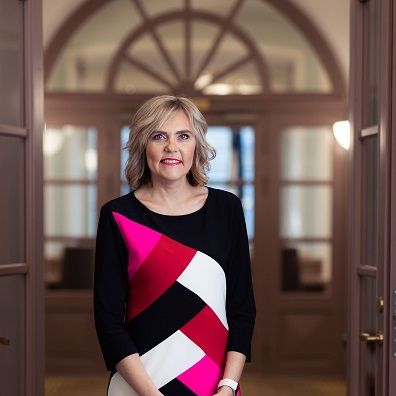Prof. Dr. Julia Laffranque
Germany
Lawyer
DAAD annual scholarship for graduates 1997-1998, Germany

Prof. Dr. Julia Laffranque
© Silver Gutmann
When Professor Julia Laffranque talks in fluent German about the time she spent studying in Hamburg, Münster and Kiel, about good relationships with German colleagues and about her gratitude to the DAAD, it is clear that the Estonian lawyer was happy to return to Germany in February 2021. As a highly respected expert in European law, she has become director of programmes at the Academy of European Law (ERA) in Trier. In addition, she was appointed deputy director of the ERA. “We provide Europe-wide funding so that lawyers can train in various fields of European law”, she explains. “I support the ERA on a specialist level, as well as with my numerous contacts and my experience in the area of digitisation.”
My time in Münster changed the way I view the world. – Julia Laffranque
Laffranque travelled to Germany in 1994 and spent a year as an exchange student at Universität Hamburg as part of her law degree. She also met her future husband, the French lawyer Rodolphe Laffranque, in this city on the Elbe river. “We decided that we would both study in Münster, which is how I came to obtain my master’s degree there”, she recounts. The DAAD funded her stay at the University of Münster in 1997 and 1998, which laid the foundations for her international career. “I compared German, Estonian and European law and learnt how to teach law with the aid of case law, examinations and case studies”, she recalls. “That was very important for my career, in both professional and personal terms.” She adds that she was also deeply impressed by the German culture and work ethic, which reinforced her own values. “My time in Münster changed the way I view the world. I discovered what it means to become socially engaged and stand up for the citizens of Europe, as well as for legal, social, economic and political developments, for democracy, freedom of opinion and the rule of law – that had been virtually impossible in Estonia until the 1990s.”
This prepared her well for her work as a civil servant at the Estonian Ministry of Justice, a position that she had already taken up in 1996: as an expert in EU law, and later as deputy state secretary, Laffranque helped prepare Estonia’s accession to the European Union. “Essentially, it was a matter of adapting the Estonian legal system and constitution so that it would meet Europe’s constitutional criteria”, she explains. “To this end, I also worked together with German professors.” In addition, she has worked for the European Commission’s Legal Service, the German Federal Administrative Court and the Council of State in France – and in 2004 was appointed as a judge at the Supreme Court of Estonia. At the same time, Laffranque taught European law at the University of Tartu from 1999 to 2006, where she acquired her PhD in 2003 and was made professor of European law in 2011. “It gives me great pleasure to support young people in their training and to encourage them to take a critical view”, she says. “My vision for Europe is that everyone should feel bound by the principle of the rule of law and that European law should be reviewed repeatedly to ensure it complies with this constitutional principle. Europe shouldn’t connect only the individual states but also the people who live in them, and should put them centre stage.”
She took another important step along her career path in 2011 when she moved to Strasbourg: as a judge at the European Court of Human Rights, Laffranque was responsible until 2020 not only for her home country, but also for complaints from Russia, Turkey and many other Council of Europe states. “That was quite a challenge on account of the huge number of cases, the at times considerable time pressure and the complexity”, she remembers.
Her commitment to Europe and to supporting the next generation has not gone unnoticed: in 2013, the European Movement Estonia named her “European of the Year”, and in 2016 she was awarded the title “best judge trainer” in Estonia. “The DAAD has played a part in this success”, says Laffranque. “To this day I am benefiting from the contacts that I made at the time, and from my good language skills. I believe that the DAAD’s work, events and alumni meetings are very valuable.”
Status: April 2021